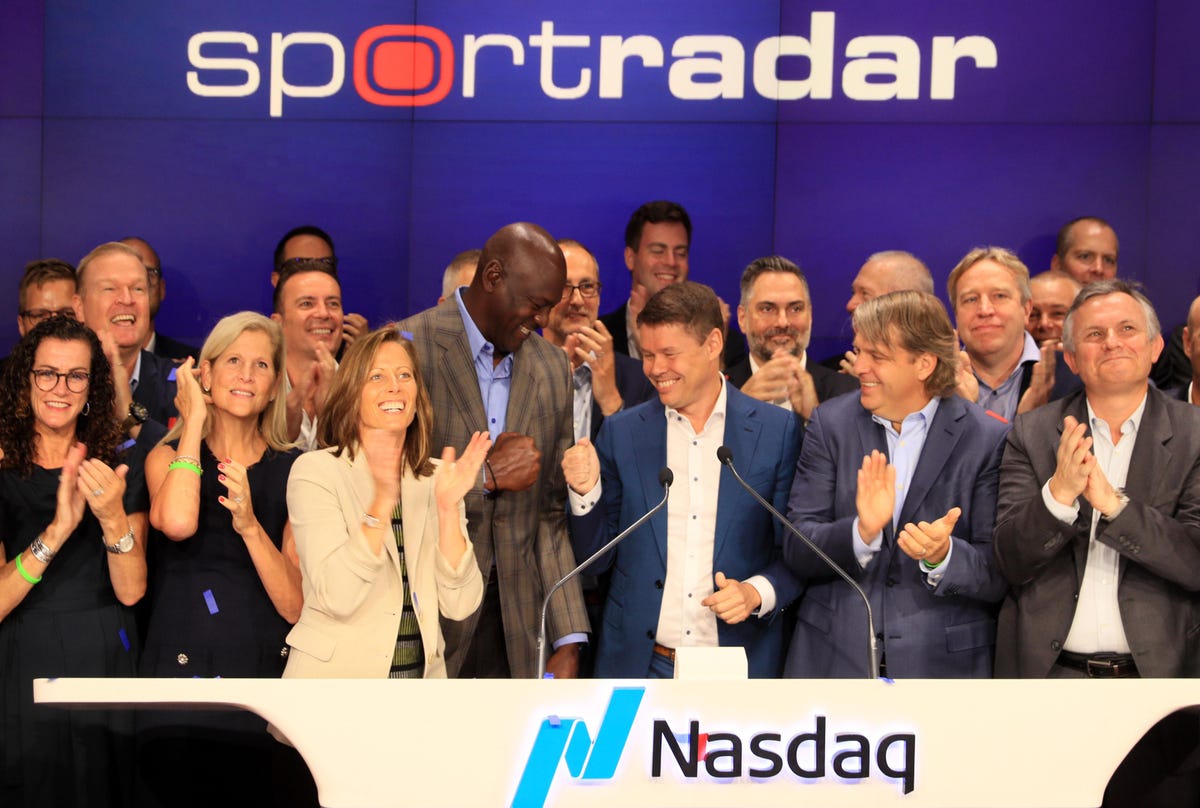
Sportradar founder and CEO Carsten Koerl celebrates with Charlotte Hornets owner Michael Jordan, who owns a minority stake in the company, at the Nasdaq exchange.
Sportradar/Nasdaq
The Switzerland-based firm, which funnels stats from sports leagues to media companies and sports bettors, debuted on the Nasdaq on Tuesday.
Twenty-one years ago, Sportradar founder and CEO Carsten Koerl found himself at a crossroads.
His first foray into the sports data space with startup Bwin had successfully gone public on Austria’s Vienna Stock Exchange, but Koerl lost control of the company he founded shortly after the IPO. Still, the deal made him financially independent, and while he doesn’t recall exactly how much he made from it, it would have been enough for him to retire at age 35.
That thought never crossed his mind, Koerl says. After taking an extended vacation in Australia, he started plotting his next move. His opportunity materialized months later in Norway, where he spent €150,000 (roughly $135,000 at the time) to buy a controlling stake in a nascent sports betting odds and data company called Market Monitor AS in 2001. The firm would eventually evolve into Sportradar.
“It was the right time to say, ‘Okay, let’s start something new because I’m on a journey,’” Koerl told Forbes on Tuesday morning over Zoom, with a beaming smile.
That decision paid off handsomely. Switzerland-based Sportradar, which helps sports leagues compile data like in-game statistics and distribute it to media companies and betting operators, went public on the Nasdaq on Tuesday. After opening at $27 per share, the company’s shares fell to $25.05 by market close, valuing the business at $7.4 billion. Koerl, who will remain CEO with 81.8% of the voting rights, also retained 31.8% of the stock. Forbes estimates his stake to be worth $2.4 billion. Charlotte Hornets owner Michael Jordan, Dallas Mavericks owner Mark Cuban, Washington Capitals owner Ted Leonsis and Los Angeles Dodgers part-owner Todd Boehly all own minority stakes in Sportradar.
Forbes estimates Koerl’s stake is worth $2.4 billion.
Sportradar
A native of southern Germany who now resides in Switzerland, Koerl, 56, says Sportradar has given him the ideal vehicle to channel his dual passions for sports and technology. His love for sports and competition began in childhood, when he was a supporter of German soccer club Bayern Munich. It persists today.
“Two weeks ago, I was swinging in a canyon in Switzerland with my son because he wanted to see if Daddy could do this or not,” Koerl says with a laugh. “Of course I can. I’m competitive.”
However, as reported in a 2018 article in the Globe and Mail, Koerl realized a future in athletics was unlikely and pivoted toward computer science. He studied electronic and microprocessor engineering at the University for Applied Sciences in Konstanz, Germany, before launching Bwin (then called Betandwin) in 1997 and Sportradar in 2001.
Today, Sportradar has become a dominant player in the sports data space. After expanding into the U.S. in 2014, it boasts more than 900 sports betting clients, such as DraftKings, FanDuel and Flutter, and 150-plus sports league partners, including the NBA, MLB and the NHL. The NHL also has the rights to purchase roughly $90 million worth of Sportradar stock as part of its data rights deal with the company, according to Sportico. According to its pre-IPO filings, Sportradar posted nearly $18 million in net profit off $478 million in revenue last year.
Yet the company is not without challenges. Uncertainty from the Covid-19 pandemic, which grounded the sports world to a halt, had threatened Sportradar’s business. Another obstacle of note: Rival data firm Genius Sports earlier this year took over the NFL’s data rights license, which Sportradar had held for two years. (The NFL still retains an equity stake of 7% in Sportradar’s U.S. subsidiary as part of an earlier agreement.) Koerl is confident he can keep his competitors at bay, citing his company’s size, revenue and profit figures. (Genius Sports has a market capitalization of $3.7 billion.)
As for achieving billionaire status, Koerl says it doesn’t change much for him. He still aims to stay out of the spotlight, but much like two decades ago, he isn’t seeking early retirement either.
“I love what I’m doing,” Koerl says. “I’m feeling super-energized, and as long as I feel valuable for the business and the company, I want to perform.”







